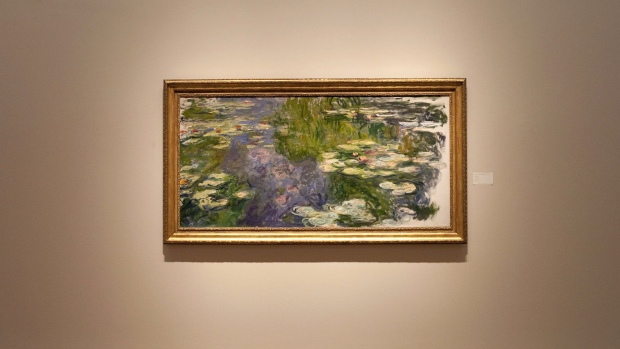Feb 1, 2023
Rich Russians’ Art Buying Is Target of US Crackdown on Trade-Sanction Cheats
, Bloomberg News

(Bloomberg) -- The US crackdown on trade-sanction violators is turning to the art world as authorities track down works bought or sold by ultra-rich Russian tycoons.
Through a series of subpoenas, federal prosecutors in New York are demanding high-end auction houses in the US turn over years of records as they seek to determine if art was smuggled offshore or if proceeds from sales were transferred illegally, according to a person familiar with the investigation.
Among those named in the subpoenas are sanctioned Russian tycoons Andrey Melnichenko, Viktor Vekselberg and Roman Abramovich, along with Ukrainian billionaire Ihor Kolomoisky, said the person, who asked not to be identified because the information isn’t yet public. The records requested of auction houses include any previous dealings with the men, according to the person, who didn’t disclose all the companies that were served subpoenas.
Among the major auction houses contacted by Bloomberg, Christie’s International Plc said it “cooperates and complies fully with law enforcement as and when we are required to do so.” Sotheby’s said it cooperates as required by law. Phillips Auction House said it has measures in place “to ensure that no individual or institution targeted by sanctions are able to do business directly or indirectly through our salerooms.”
Bonhams & Butterfields Auctioneers Corp. didn’t respond to requests for comment.
Since Russia’s invasion of Ukraine, the US has expanded sanctions targeting Russian businessmen and companies with ties to Vladamir Putin. That’s led to seizures of luxury assets, from a yacht in the South Pacific to art work in a French gallery. The US Justice Department also plans to seize a Greenwich Village townhouse linked to Russian billionaire Oleg Deripaska.
Read more: Art Seized at US Homes Part of Crackdown on Wealthy Russians
With its search of auction houses, the department is looking to track down “professional sanctions evaders” — people who help the wealthy avoid restrictions and launder money. This month, prosecutors charged two men, including a former FBI special agent, with aiding Deripaska and violating sanctions.
According to Georges Lederman, an attorney who specializes art crime and asset forfeiture cases, the crackdown has been the result of greater coordination between the Treasury Department’s Office of Foreign Assets Control, which oversees the sanctions list, and prosecutors trying to stop money laundering.
“In the past if you violated a sanction, you got a big fine and then you had to implement a more sophisticated anti-money laundering program,” Lederman said. “But now, because of Russia sanctions and heightened awareness, there is a greater referral of money laundering prosecutions.”
In recent months, prosecutors in Manhattan have narrowed the focus of their inquiries, asking about specific artworks bought years ago, as well as some real estate, according to the person familiar with the matter. The probe is being led by the US Attorney’s Office in the Southern District of New York and the federal KleptoCapture task force, which was set up to police Russian sanctions. A spokesman for KleptoCapture declined to comment.
$50 Million Monet
Fertilizer tycoon Melnichenko, with a net worth estimated at $12.7 billion by the Bloomberg Billionaires Index, is said to have purchased Monet’s “Le Bassin aux Nympheas” for 40.9 million pounds ($49.6 million) in 2009. Abramovich is Russia’s second-largest steelmaker and previously owned London’s Chelsea Football Club. His ex wife, Daria Zhukova, was a Russian art collector.
KleptoCapture’s lead prosecutor Andrew Adams told the NYC Bar Association in November that his team was focused on taking “assets off the table” before they could be moved to other jurisdictions.
One such alleged facilitator was UK businessman Graham Bonham-Carter, who was indicted in October and accused of trying to transfer artwork owned by Deripaska, who is under US sanctions. Using a shell company, Deripaska purchased 18 pieces of art at a New York auction in 2008, a decade before he was sanctioned, according to an indictment. The art works were kept in a New York storage facility until Bonham-Carter allegedly try to ship them out of the country in 2021.
Bonham-Carter is fighting extradition from the UK to the US to face charges.
In the wake of a 2020 Senate report on sanctions evasion in the art world, major auction houses and private sellers started including as a standard condition in contracts that the buyer or seller not be sanctioned or engaged in criminal activity, said Thomas C. Danziger, a New York-based attorney specializing in art law.
The leading auction houses have implemented voluntary anti-money laundering programs, but that may not be enough to prevent the true owners of art works from shielding themselves themselves behind webs of corporate structures or relatives.
“Putin’s banker is unlikely to walk into a gallery on Madison Avenue and buy a Picasso,” Danziger said.
(Updating response from Sotheby’s in fourth paragraph)
©2023 Bloomberg L.P.


